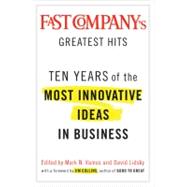
| FORWORD by Jim Collins | xv | ||||
| INTRODUCTION by Mark N. Vamos, editor, Fast Company | xxi | ||||
| Handbook of the Business Revolution | 1 | (3) | |||
|
|||||
|
|||||
| Everything I Thought I Knew About Leadership Is Wrong | 4 | (11) | |||
|
|||||
|
|||||
|
|||||
| Wide Awake on the New Night Shift | 15 | (4) | |||
|
|||||
|
|||||
|
|||||
| Starwave Takes the Web...(Seriously) | 19 | (13) | |||
|
|||||
|
|||||
|
|||||
| The Brand Called You | 32 | (11) | |||
|
|||||
|
|||||
|
|||||
|
|||||
|
|||||
| Free Agent Nation | 43 | (16) | |||
|
|||||
|
|||||
| Genius at Work | 59 | (13) | |||
|
|||||
|
|||||
| The Agenda—Grassroots Leadership | 72 | (10) | |||
|
|||||
|
|||||
| Why We Buy | 82 | (10) | |||
|
|||||
|
|||||
|
|||||
| Are You on Craig's List? | 92 | (8) | |||
|
|||||
|
|||||
| Built to Flip | 100 | (12) | |||
|
|||||
|
|||||
| "What Are We After? We Are Literally Trying to Stop Time" | 112 | (9) | |||
|
|||||
|
|||||
|
|||||
| The Permatemps Contratemps | 121 | (16) | |||
|
|||||
|
|||||
| "We Take Something Ordinary and Elevate It to Something Extraordinary" | 137 | (13) | |||
|
|||||
|
|||||
| "But Wait, You Promised..." "...And You Believed Us? Welcome to the Real World, Ma'am" | 150 | (15) | |||
|
|||||
|
|||||
|
|||||
| Grassroots Leadership: U.S. Military Academy | 165 | (11) | |||
|
|||||
|
|||||
|
|||||
| Boomtown, U.S.A. | 176 | (10) | |||
|
|||||
|
|||||
| The New Face of Global Competition | 186 | (12) | |||
|
|||||
|
|||||
|
|||||
|
|||||
| Adding Value—But at What Cost? | 198 | (3) | |||
|
|||||
|
|||||
| Still Angry After All These Years | 201 | (7) | |||
|
|||||
|
|||||
|
|||||
| How to Give Feedback | 208 | (3) | |||
|
|||||
|
|||||
|
|||||
| And Now the Hard Part | 211 | (12) | |||
|
|||||
|
|||||
| The Toll of a New Machine | 223 | (10) | |||
|
|||||
|
|||||
|
|||||
|
|||||
| The Thrill of Defeat | 233 | (11) | |||
|
|||||
|
|||||
|
|||||
|
|||||
| A Design for Living | 244 | (11) | |||
|
|||||
|
|||||
|
|||||
|
|||||
| In Search of Courage | 255 | (5) | |||
|
|||||
|
|||||
|
|||||
| Balance Is Bunk! | 260 | (9) | |||
|
|||||
|
|||||
|
|||||
| The Accidental Guru | 269 | (10) | |||
|
|||||
|
|||||
|
|||||
| The 10 Lives of George Stalk | 279 | (12) | |||
|
|||||
|
|||||
| Gospels of Failure | 291 | (9) | |||
|
2005 | ||||
|
|||||
|
|||||
|
|||||
|
|||||
| Making Change | 300 | (12) | |||
|
|||||
|
|||||
|
|||||
|
|||||
|
|||||
| Join the Circus | 312 | (9) | |||
|
|||||
|
|||||
|
|||||
| INDEX | 321 |
The New copy of this book will include any supplemental materials advertised. Please check the title of the book to determine if it should include any access cards, study guides, lab manuals, CDs, etc.
The Used, Rental and eBook copies of this book are not guaranteed to include any supplemental materials. Typically, only the book itself is included. This is true even if the title states it includes any access cards, study guides, lab manuals, CDs, etc.